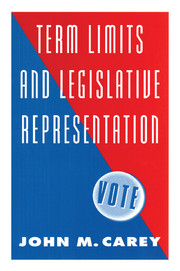Book contents
- Frontmatter
- Contents
- List of tables and figures
- Preface
- Part I Term limits and comparative politics
- Part II The Latin American cases
- 3 Term limits and political careers
- 4 Term limits and particularism
- 5 Term limits and legislative party cohesiveness
- Part III Term limits and the United States
- References
- Index
5 - Term limits and legislative party cohesiveness
Published online by Cambridge University Press: 06 July 2010
- Frontmatter
- Contents
- List of tables and figures
- Preface
- Part I Term limits and comparative politics
- Part II The Latin American cases
- 3 Term limits and political careers
- 4 Term limits and particularism
- 5 Term limits and legislative party cohesiveness
- Part III Term limits and the United States
- References
- Index
Summary
Parties in the Costa Rican Legislative Assembly are less cohesive than those in the Venezuelan Congress, and legislative term limits are the principal cause of the difference. By cohesiveness, I mean the tendency of copartisan legislators to vote together on policy. All Venezuelan deputies who intend to continue their political careers are dependent on a stable cadre of party leaders who determine candidate positions on ballot lists; so all ambitious Venezuelan deputies are responsive to the same set of directives. Costa Rican deputies, on the other hand, face uncertainty over (1) whether any post-Assembly appointments will be available to members of their party, and (2) who within their party might control post-Assembly appointments. In the first place, if a Costa Rican deputy's party loses the next presidential election, no amount of party loyalty will gain the deputy a post-Assembly appointment. Second, party caucuses in the Legislative Assembly are likely to be divided among supporters of various aspirants for the party's presidential nomination. Thus, legislative term limits in Costa Rica mandate that the prospects for sustaining a political career based on party loyalty are more bleak than in Venezuela, and the criteria for party loyalty themselves are much less clear.
This argument should be qualified by noting that Costa Rican parties have been organized so as to mitigate the damage to party cohesiveness caused by term limits. Chapters 3 and 4 have been largely devoted to outlining measures that parties have taken to this end.
- Type
- Chapter
- Information
- Term Limits and Legislative Representation , pp. 136 - 156Publisher: Cambridge University PressPrint publication year: 1996
- 1
- Cited by



